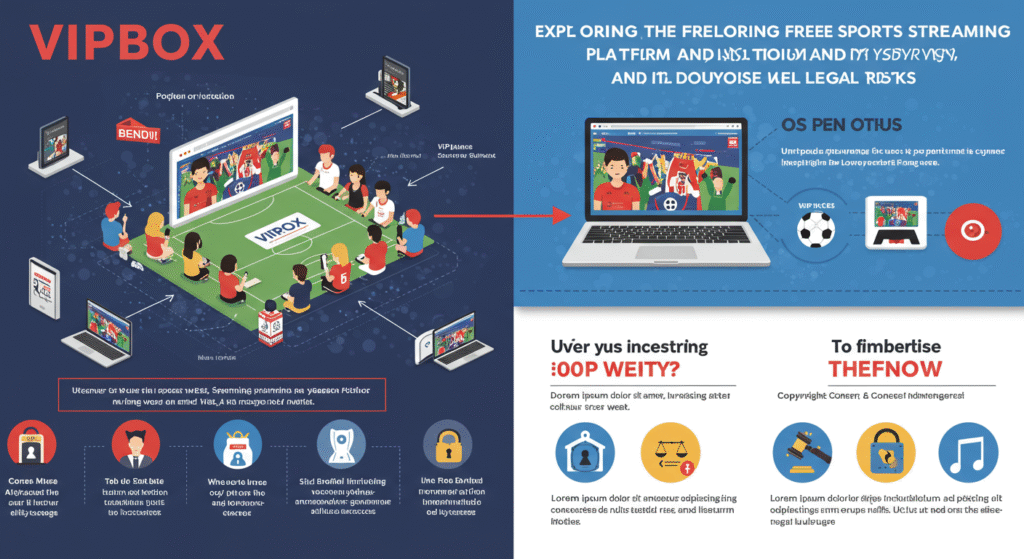In the digital age, fans expect instant access to sports from around the world—whether it’s football, basketball, boxing, or Formula 1. While official streaming services like ESPN+, DAZN, and Peacock dominate the paid market, many users turn to free sports streaming websites to watch games without subscriptions.
Among these, VIPBox (or VIPBox TV) became one of the most well-known platforms, offering live sports streams to millions of viewers globally. However, while it provides access to an enormous library of matches and events, VIPBox also sits in a legal gray area, raising questions about copyright, privacy, and online safety.
What Is VIPBox?
VIPBox is a free sports streaming website that aggregates links to live broadcasts of sporting events across multiple disciplines. It’s not an official rights-holder—it acts as a content indexing platform, connecting users to third-party streams of matches, tournaments, and championships from around the world.
VIPBox gained massive popularity for its user-friendly interface, wide range of sports coverage, and accessibility across devices. With just a few clicks, users could find links to:
-
Football (soccer) matches
-
NFL and NBA games
-
Tennis tournaments
-
Cricket and rugby matches
-
UFC and boxing fights
-
Formula 1 and MotoGP races
The platform also provided access to niche sports, such as darts, snooker, and cycling—categories often overlooked by mainstream broadcasters.
How VIPBox Works
Unlike subscription-based streaming platforms, VIPBox doesn’t host its own videos. Instead, it embeds or redirects users to third-party servers where live streams are available.
Here’s how it generally works:
-
Users visit the VIPBox website.
-
They select a sport or event from a categorized list.
-
The site displays several external links offering live feeds.
-
Users click on one of the links to access the stream (usually through an embedded player).
This structure allows VIPBox to operate without maintaining direct control over the content—technically, the videos are hosted elsewhere. However, this model also exposes users to security and copyright risks, since the legality of the source streams varies by jurisdiction.
The Features That Made VIPBox Popular
Despite its controversial nature, VIPBox gained popularity because of several attractive features:
1. Free Access
The most obvious advantage is cost. VIPBox offered free access to live sports events that would otherwise require paid subscriptions. For many fans, especially those in regions without access to official broadcasters, it was an appealing alternative.
2. Wide Range of Sports
From mainstream leagues like the Premier League, NBA, and UFC to smaller tournaments and college games, VIPBox aggregated streams from across the sports spectrum.
3. Global Accessibility
VIPBox was accessible worldwide through standard browsers. Users didn’t need to install software or create accounts—reducing friction and making it easy to use on desktop and mobile.
4. Real-Time Updates
The platform updated its links frequently, offering multiple backup streams in case one source failed. This helped users maintain access even when links went down mid-game.
The Legal Gray Area of VIPBox
While VIPBox presented itself as a harmless sports aggregator, it exists in a legally ambiguous space. The website doesn’t own broadcasting rights for the sports it streams, and those rights are typically held by large media organizations.
1. Copyright Violation
By facilitating access to unlicensed streams, VIPBox indirectly infringes on copyright laws in many countries. Broadcasters invest heavily in acquiring sports rights, and unauthorized redistribution—whether direct or indirect—can be considered illegal.
2. DMCA and ISP Actions
In the United States and European Union, rights holders have filed DMCA takedown requests and pushed Internet Service Providers (ISPs) to block VIPBox and similar domains. As a result, VIPBox frequently changes domain names (e.g., VIPBox.tv, VIPBox.to, VIPBox1.com) to remain accessible.
3. User Liability
In most cases, viewers are not prosecuted for simply watching a stream. However, depending on national laws, accessing or sharing copyrighted content without authorization can still carry risks—especially if users download, redistribute, or monetize the content.
The Risks of Using VIPBox
While VIPBox may appear convenient, it exposes users to multiple risks beyond just legality.
1. Malware and Phishing
Free streaming sites often rely on ad networks that are poorly regulated. Clicking on pop-up ads or fake “Play” buttons may lead to malware, phishing sites, or fake browser updates designed to steal personal information.
2. Data Privacy Threats
Because VIPBox does not require user accounts, it doesn’t collect identifiable data directly—but the third-party sites it redirects to often do. These external pages can track IP addresses, browsing behavior, or even install cookies without consent.
3. Fake Mirror Sites
The original VIPBox domain has been cloned by dozens of mirror and fake websites, many of which serve as traps for unsuspecting users. These sites often contain malicious scripts or require suspicious browser permissions.
4. Legal Notices and ISP Warnings
In some countries, ISPs issue warnings when users access blacklisted streaming sites. Repeated violations could result in throttled connections or access restrictions.
Safer Legal Alternatives to VIPBox
As governments and broadcasters crack down on illegal streaming, legitimate sports streaming services have become more affordable and accessible. Here are a few recommended alternatives to VIPBox that provide legal, high-quality streams:
| Platform | Coverage | Pricing | Availability |
|---|---|---|---|
| ESPN+ | U.S. sports, UFC, MLS, college games | Low monthly fee | U.S. |
| DAZN | Boxing, MMA, soccer, motorsports | Monthly/annual plans | Global |
| FuboTV | Live TV + sports channels | Subscription-based | U.S., Canada, Spain |
| SonyLIV | Cricket, UEFA, tennis | Regional plans | Asia |
| MOLA TV / Hotstar / Now Sports | Regional events | Varies by country | Asia / UK |
| YouTube Sports Channels | Official highlights, live events | Free / Ads | Global |
These platforms offer reliable, ad-free experiences and ensure that rights holders, athletes, and broadcasters are compensated fairly.
The Ethics Behind Free Streaming
The ethical debate surrounding platforms like VIPBox mirrors larger issues in the digital entertainment industry.
1. Accessibility vs. Piracy
Supporters argue that free streaming provides access to sports for fans in countries where legal streaming options are unavailable or overpriced. Critics, however, contend that piracy undermines legitimate broadcasters and reduces funding for teams and athletes.
2. Fair Use and Global Inequality
Some fans justify using sites like VIPBox as a form of digital protest—a reaction to the monopolization of sports rights by large corporations. The debate raises important questions about whether global fans should be punished for wanting to watch their favorite teams in real time.
3. Responsibility of Viewers
Ultimately, while the convenience of free streaming is undeniable, users must weigh short-term benefits against long-term consequences—such as contributing to piracy ecosystems or compromising their cybersecurity.
The Cat-and-Mouse Game: VIPBox and Domain Blocks
Over the years, VIPBox has faced continuous takedowns from authorities and copyright agencies. Each time one domain is blocked, new mirror sites emerge. This phenomenon is known as the “whack-a-mole effect” of internet piracy.
Common domain variations have included:
-
VIPBox.tv
-
VIPBox.to
-
VIPBox1.com
-
VIPBox.sx
-
VIPBox.nu
Because of this constant rotation, users searching for “VIPBox” online often encounter clones, phishing sites, or outdated links. Even if some mirrors remain accessible, their reliability and safety vary greatly.
Protecting Yourself When Streaming Online
If users choose to explore free streaming websites—regardless of legality—they should at least take steps to protect themselves digitally.
1. Use a VPN (Virtual Private Network)
A VPN hides your IP address and encrypts your connection, reducing the risk of ISP tracking or geographic restrictions.
2. Install an Ad Blocker
Ad blockers like uBlock Origin or Brave Browser’s built-in shields can prevent pop-ups and malicious ads from executing harmful scripts.
3. Avoid Download Prompts
Never download “video players” or browser extensions from free streaming sites. They’re often malware in disguise.
4. Use Reliable Antivirus Software
Regular scans with updated antivirus tools can detect and remove hidden infections caused by malicious streaming links.
5. Favor Official Streams When Possible
Even if unofficial sources seem more convenient, legitimate streaming services offer higher-quality, safer experiences without the ethical and legal risks.
The Broader Impact of Sites Like VIPBox
Free sports streaming platforms highlight the demand for accessible global sports coverage. They expose gaps in official broadcasting models that fail to accommodate international fans, particularly those without local licensing deals.
For broadcasters and leagues, this trend signals a need for:
-
Affordable subscription tiers
-
Localized coverage for underserved regions
-
Flexible access models (e.g., pay-per-match options)
When official channels improve accessibility, reliance on piracy platforms like VIPBox naturally declines.
Conclusion
VIPBox represents both the allure and danger of free online sports streaming. It democratized access to live sports, connecting millions of fans worldwide—but it did so by stepping into a legal and ethical gray zone.
While VIPBox offered convenience and variety, its risks—ranging from malware to copyright violations—make it a questionable choice for modern sports fans. As technology evolves and legitimate streaming becomes more accessible, viewers are better off choosing official, secure platforms that respect both creators and consumers.
In the long run, supporting legal streaming ensures a healthier sports ecosystem—where fans can enjoy their favorite games safely, ethically, and sustainably.






